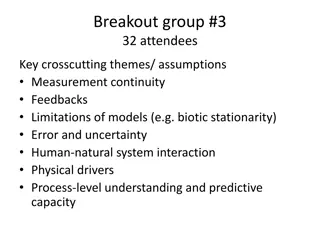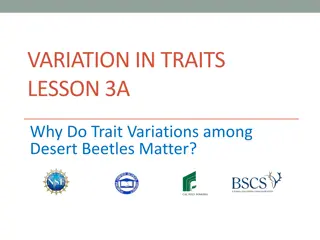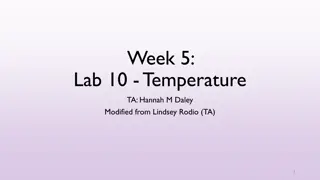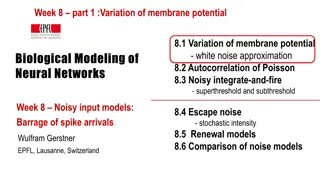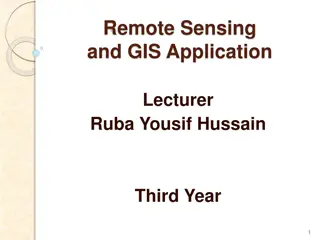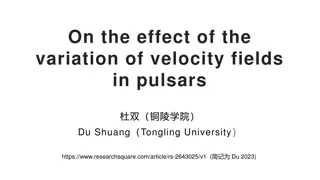The Economic Size
Economies of scale and how it can benefit businesses. Learn about the different types of economies of scale and their effects on production costs. Discover the sources that can help achieve economies of scale.
1 views • 21 slides
Scale Based Regulation 2023 - Non-Banking Financial Company (NBFCs)
On October 19, 2023, the Reserve Bank of India (\u201cRBI\u201d) has issued \u2018Master Direction \u2013 Reserve Bank of India (Non-Banking Financial Company \u2013 Scale Based Regulation) Directions 2023\u2019 (\u2018SBR Master Direction\u2019). The SBR Master Direction aims to harmonize the Previ
0 views • 9 slides
Precision Fermentation in Sustainable Food Production
Precision Fermentation is a specialized bioprocessing technique that utilizes microbes as cell factories to produce specific functional ingredients like proteins, vitamins, enzymes, and more. This innovative technology addresses the challenges of increasing food demands in a sustainable way, offerin
1 views • 12 slides
Understanding Scale Factors and Ratios in Similar Figures
Explore the concept of scale factors and ratios in similar figures through visible learning intentions, warm-up exercises, and practical examples. Learn to determine the scale factor between two similar figures, use scale factors to find missing sides, and apply the knowledge in real-world scenarios
3 views • 13 slides
Expert Scale Calibration Company Near Houston - Onsite Services
In need of a professional scale calibration company near Houston? Look no further than Houston Precision. We specialize in onsite scale calibration services to ensure your weighing equipment operates with the highest accuracy. Our team is dedicated to helping businesses maintain compliance with indu
0 views • 2 slides
Introduction to Spark Streaming for Large-Scale Stream Processing
Spark Streaming, developed at UC Berkeley, extends the capabilities of Apache Spark for large-scale, near-real-time stream processing. With the ability to scale to hundreds of nodes and achieve low latencies, Spark Streaming offers efficient and fault-tolerant stateful stream processing through a si
0 views • 30 slides
Importance and Types of Scale in Architecture
Scale is crucial in architecture for accurate designs and execution. Standard scales are used in architectural drawings to set object sizes, such as human scale and miniature scale. Human scale relates to human dimensions, while miniature scale reduces object sizes. Understanding these scales enhanc
1 views • 6 slides
Understanding Acids and Alkalis: pH Scale and Indicators
Explore the differences between acids and alkalis, learn about indicators, pH scale, and how to categorize solutions as acidic, alkaline, or neutral. Understand the importance of universal indicators in determining acid and alkali strength. Discover the disadvantages of using red and blue litmus pap
3 views • 11 slides
Understanding Large Scale Retailing and Store Classification
Large scale retailing encompasses department stores, multiple shops, mail-order businesses, and super bazaars. It can be classified into store-based and non-store based retailing, further divided based on ownership and merchandise offered. Store-based retailers include independent retailers, chain r
1 views • 16 slides
Understanding the Geological Time Scale and Earth's Evolution
Studying the geological time scale is crucial for comprehending Earth's history, evolution of life, and significant events that shaped our planet. Evidences like field observations, fossil records, and radioactive dating contribute to constructing this vast timeline. Major occurrences such as mass e
1 views • 46 slides
Exploring Plant Traits: Do Plants Exhibit Variation in Traits?
Discover in this lesson whether plants display variations in traits through the measurement of plant lengths. Students analyze data tables of carrots and leaves to observe trait variations and discuss patterns found in bar graphs and data tables. The focus is on understanding how to identify and int
0 views • 11 slides
Understanding pH Scale and Hydronium Ion Concentration
The pH scale is a logarithmic measurement that indicates the acidity or alkalinity of a solution based on the concentration of hydronium ions. pH values range from 0 to 14, with 7 being neutral. Lower pH values indicate acidity, while higher values indicate alkalinity. This scale provides a convenie
0 views • 104 slides
The New Trade Theory and Economies of Scale in International Trade
The New Trade Theory, emerged in the 1970s, challenges traditional trade theories by emphasizing the role of increasing returns and economies of scale in international trade. It introduces the concept of industrial organization and imperfect competition to explain how countries trade not only based
0 views • 12 slides
IWG Measurement Uncertainties: Justification of Impact Quantities
Explore the justification of main impact quantities in IWG Measurement Uncertainties session held on 6th and 7th October 2020. The analysis includes factors such as deviation from centered driving, start of acceleration, speed variations, load variations, background noise, temperature effects on noi
3 views • 25 slides
Understanding Acids and Bases: pH Scale Explained
Exploring the pH scale, this content delves into the fundamentals of acidity and alkalinity, covering what pH stands for, the inventor of the pH scale, reactions when acids and bases combine, and where the weakest acids and bases are found on the pH scale.
0 views • 7 slides
Parity-Only Caching for Robust Straggler Tolerance in Large-Scale Storage Systems
Addressing the challenge of stragglers in large-scale storage systems, this research introduces a Parity-Only Caching scheme for robust straggler tolerance. By combining caching and erasure coding techniques, the aim is to mitigate latency variations caused by stragglers without the need for accurat
0 views • 29 slides
Taking Web Caching to the Next Level: Challenges and Solutions
Web caching plays a crucial role in improving user experience and reducing internet congestion. By implementing shared web caching on a larger scale, we can achieve significant benefits in terms of latency reduction. However, this approach comes with challenges such as efficient storage and retrieva
1 views • 20 slides
Economies of Scale in Dutch Primary Education: A Multi-level Cost Model
This paper explores economies of scale in Dutch primary education, focusing on school boards and school compositions. The study examines the impact of school size variations on cost determination at both levels, considering the challenges of limited input data availability. Different solutions are p
3 views • 16 slides
Consultation on 2023/24 Fee Scale by PSAA: Key Points and Deadlines
PSAA is conducting a crucial consultation to set the fee scale for 2023/24, involving elements like audit fees, legal framework, and consultation details with stakeholders. The process includes setting scale fees, handling fee variations, adhering to statutory roles, and addressing the audit backlog
0 views • 30 slides
Deconvolving Snow Cover and Snowfall Passive Microwave Signals
This research focuses on deconvolving snow cover and snowfall passive microwave signals using GPM data. The study employs a data-driven approach to estimate snowfall using a nested K-nearest algorithm and observed irregularities. By analyzing variations in brightness temperatures (Tbs) over snow-cov
0 views • 9 slides
Pathological Differences in Hip Joint Variations: Abnormal Gait Analysis
Understanding pathological gait variations related to hip joint differences is crucial in gait analysis. Excessive sagittal, coronal, and transverse plane motions impact stance and swing phases, leading to deviations in gait patterns. Excess flexion, limited flexion, past retraction, excess adductio
0 views • 13 slides
Understanding Scale Factors and Similar Shapes in Graphic Design
Graphic artists often need to resize shapes for different purposes while ensuring they maintain their original proportions. This involves determining the scale factor between similar shapes, understanding how to find the scale factor using corresponding sides, and dealing with scenarios where sides
0 views • 8 slides
Understanding Horizontal Boundaries of Firms in Economics
Exploring the concept of horizontal boundaries in firm behavior, this lecture delves into Long-run Average Cost curve, economies and diseconomies of scale, optimal plant size, and the Minimum Efficient Scale. It discusses how economies of scale affect production costs and the relationship between ma
0 views • 25 slides
WMO Scale of Assessment and Working Capital Fund
The WMO Scale of Assessment for members' contributions and the Working Capital Fund is based on the United Nations Scale, adjusted for differences in membership every 3 years. The latest scale approved by EC-75 for 2023 uses the UN scale from December 2021. The rates for 2026-2027 will be determined
0 views • 9 slides
Understanding Pressure Ulcer Risk Assessment with the Braden Scale
Pressure ulcer risk assessment is crucial in healthcare settings to identify individuals at risk of developing pressure ulcers. The Braden Scale, developed in 1984, evaluates six key elements contributing to pressure ulcer development. It provides a standardized method for assessing risk levels base
0 views • 20 slides
Importance of Rock v. MWB [2018] UKSC 24 as Explained by Lord Sumption
The case of Rock v. MWB [2018] UKSC 24 holds significant importance due to the ruling by Lord Sumption and the Supreme Court's decision regarding contract variations. It revolved around a dispute between MWB, a serviced office provider, and Rock Advertising over alleged contractual variations made o
0 views • 12 slides
Understanding Temporal Variability of Ecosystem Processes across Land and Ocean
This content delves into the broad-scale and cross-scale ecosystem processes on land and in the ocean, exploring their temporal variations influenced by underlying structures, biodiversity, and climate. It emphasizes the importance of considering structure, function, and climate response simultaneou
1 views • 9 slides
Importance of Trait Variations in Desert Beetles
Exploring the significance of trait variations among desert beetles, this lesson delves into why variations matter and how they impact survival in the desert environment. Through activities and discussions, students analyze traits, predict beetle survival, and understand the implications of variatio
0 views • 10 slides
Understanding Factors Influencing Temperature Variations in US Cities
Solar zenith angle, location, specific heat, and axial tilt are key factors influencing temperature variations in US cities. Proximity to water bodies, altitude, and latitude also play significant roles. This lab explores why coastal cities experience different temperature patterns compared to inlan
0 views • 8 slides
Comparing Scale-Up vs. Scale-Out in Cloud Storage and Graph Processing Systems
In this study, the authors analyze the dilemma of scale-up versus scale-out for cloud application users. They investigate whether scale-out is always superior to scale-up, particularly focusing on systems like Hadoop. The research provides insights on pricing models, deployment guidance, and perform
0 views • 27 slides
Sub-femtosecond Bunch Length Diagnostic and Machine Performance Optimization
Characterizing bunch profiles of sub-ps pulses for machine performance optimization and understanding beam variations in emittance. Current bunch length measurement techniques are limited to a few fs, prompting the need for femtosecond resolution. Techniques like Coherent Radiation Interferometry an
0 views • 15 slides
Exploring Snake Traits and Variations
Delve into the world of snakes to understand their shared traits and diverse variations. Discover how these variations in traits help snakes survive and reproduce, offering insights into their unique characteristics and evolutionary advantages.
0 views • 14 slides
Exploring Bird Variations: A Comparative Study
Dive into the world of bird variations in this informative lesson discussing how birds are alike and different, the importance of traits, and exploring differences among bird species. Discover the concepts of variations and traits through engaging activities and observations.
0 views • 14 slides
Exploring Membrane Potential Variations in Neural Networks
Delve into the dynamics of membrane potential variations in neural networks through topics like white noise approximation, autocorrelation of Poisson processes, and the Noisy Integrate-and-Fire model. Investigate how these variations manifest at different thresholds, shedding light on the biological
0 views • 63 slides
Remote Sensing and GIS Applications in Photogrammetry: Understanding Scale Variations
Exploring the fundamental principles of photogrammetry in remote sensing and GIS applications, this content delves into the science of measurements from aerial photographs. It discusses the implications of scale differences on maps and aerial photographs, emphasizing the variations in scale due to t
0 views • 19 slides
Impact of Velocity Field Variations on Pulsar Magnetic Fields
The study explores how variations in velocity fields affect pulsar magnetic fields, highlighting the conversion of kinetic energy to magnetic energy in pulsars. Glitches in these systems can lead to changes in magnetic fields, influencing pulsar emissions. The maintenance of stable magnetic fields a
0 views • 14 slides
PrEP Scale Up in Kenya: Bridge to Scale Project Overview
PrEP Scale Up in Kenya: Bridge to Scale Project sessions in 2017 discussed the National HIV Prevalence, PrEP journey, TWG composition, milestones, sub-committees, and outputs focusing on scaling up PrEP as an effective HIV-prevention intervention.
0 views • 20 slides
Understanding Scale Drawings and Compass Points
Learn to interpret information from problems, create scale drawings, solve real-life problems using scale drawings, understand compass points, and follow directions accurately. Practice solving problems involving scale drawings, bearings, compass points, and map directions to enhance your spatial sk
0 views • 19 slides
Traffic Flow Variations in Urban Areas: A Comparative Study Between 1980 and 2015
This study compares the traffic flow variations in urban areas, focusing on average daily traffic totals, daily traffic volumes, and monthly variations between the years 1980 and 2015 in Johannesburg. Data collection locations, including traffic data from different sites and lanes, are presented alo
0 views • 20 slides
Scale Learning Adventures: Movie Magic and Visible Learning
Embark on a journey of scale learning through engaging activities such as Butterfly Scale Warm-up, Hobbit Holes and Hogwarts exploration, and applying knowledge at Hagrid's Shack. Discover how scale is used in real-life situations and solve problems using ratios with success criteria in mind.
0 views • 10 slides








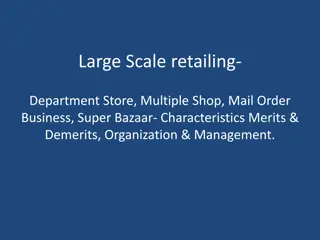
















![Importance of Rock v. MWB [2018] UKSC 24 as Explained by Lord Sumption](/thumb/193348/importance-of-rock-v-mwb-2018-uksc-24-as-explained-by-lord-sumption.jpg)
